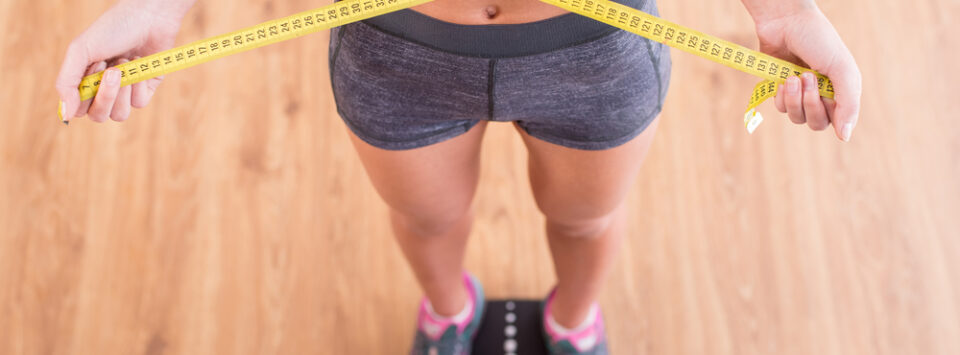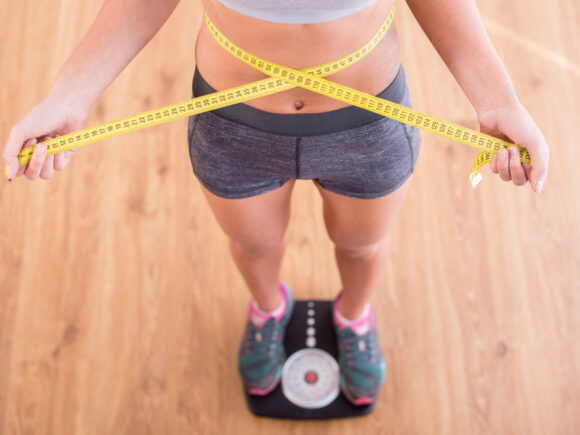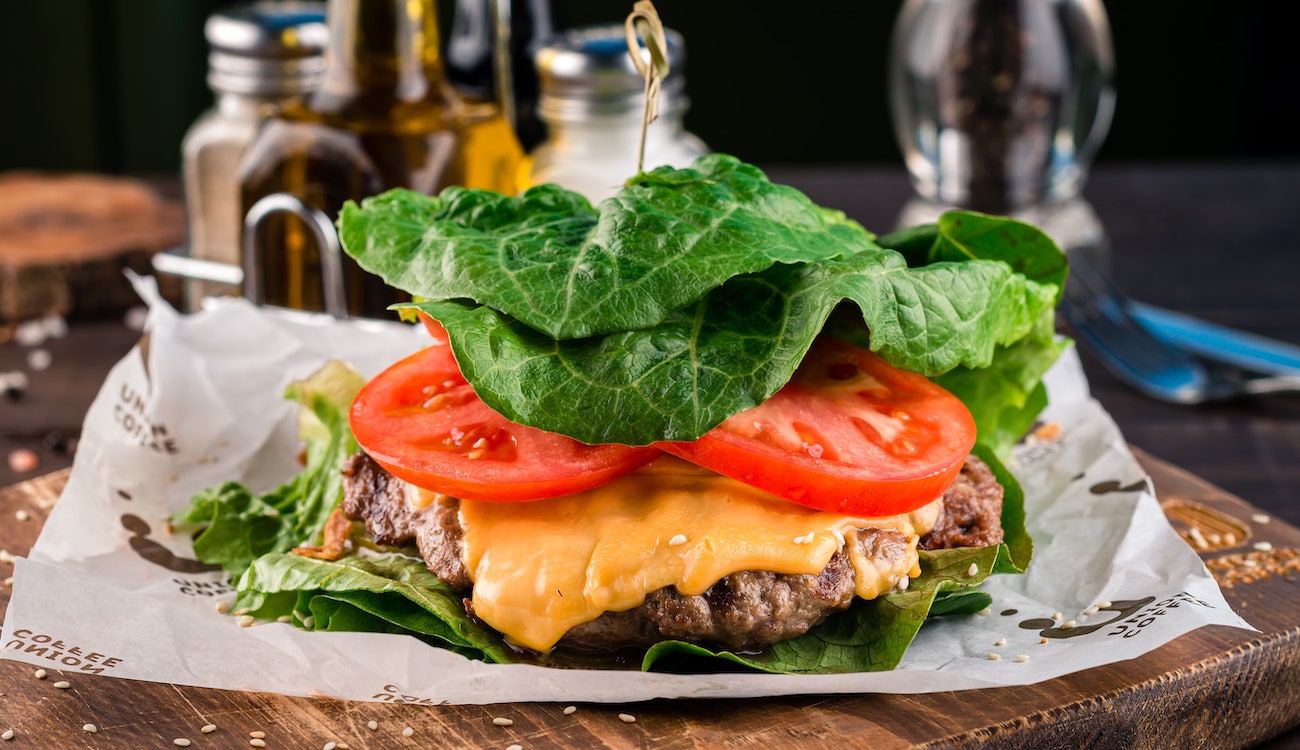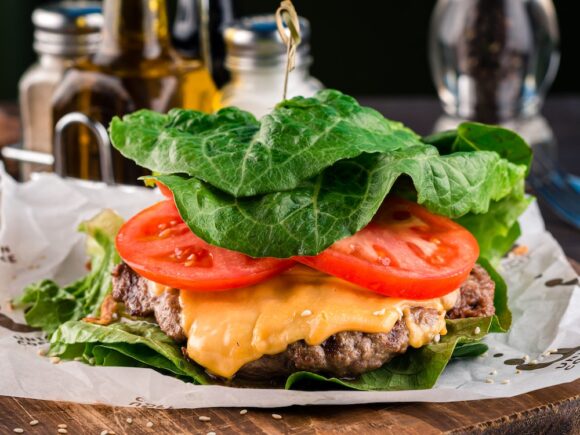Not Losing Weight on Keto


Many people adopt the ketogenic diet to lose weight and achieve other health benefits, such as lowering blood sugar levels, reducing the risk of diabetes, and more. However, despite your best efforts, you may not be able to lose weight on keto.
You may not have lost any weight at all on keto. Or maybe things were going well, but suddenly you stopped losing weight on keto and hit the keto plateau.
Don’t worry! You’re not the only one Googling, “Why am I not losing weight on keto?” Not losing weight on keto is pretty common. We’ve compiled a list of the top reasons you might not lose weight on keto and what you can do to reverse it.
9 Reasons You’re Not Losing Weight on Keto
A weight loss plateau or your keto diet not working at all can both be discouraging. It usually comes down to the following reasons:
#1 You’re eating too many carbs
One of the main reasons most people fail to lose weight on low-carb diets like keto is that they eat too many carbohydrates. Most of the calories on the keto diet should come from fat (about 70%) and protein (about 25%). Only about 5% of your daily calories should come from carbohydrates.
Because keto diets contain very few carbohydrates, they force your body to burn body fat instead of glucose for energy. This puts you in a metabolic state called ketosis.
Many people believe that following the ketogenic diet will automatically put them into ketosis. In fact, it can be difficult, especially for beginner keto dieters. You need to be meticulous about your macros and know exactly how much fat, protein, and carbohydrates you consume each day.

On keto, in addition to total carbs, you should also track net carbs. Net carbs are total carbs minus fiber and most sugar alcohols. While fiber and sugar alcohols count toward your total carb intake, they do not spike your blood sugar levels. Therefore, they do not affect ketosis. Net carbs do, however, which is why you want to limit their intake.
Keep in mind that too much protein can also affect your fat-burning state. Many protein-rich products are also high in calories and carbs. Processed foods can also be deceptive. They tend to have more carbs and sugar than homemade alternatives. So they can easily add to your total carbs.
Signs that You Are in Ketosis
When your body enters ketosis, the liver produces ketones by breaking down fat cells. Then, the body uses ketones as fuel for the brain and bodily functions. The presence of ketones manifests in various ways, such as:
- Increased energy and focus
- Fewer cravings and less frequent feelings of hunger
- Weight loss or a maintained healthy weight
- Keto breath: a strong metallic or fruity breath
- Keto flu: temporary muscle cramps and cravings
If you are unsure if you’ve entered ketosis, there are a series of tests you can take to verify their presence:
- Urine strips or sticks: These are cost-effective and easy to use. However, they monitor leftover ketones in the urine and, therefore, can be inaccurate. As your body adapts to you being in ketosis, it’ll use up more ketones and expel fewer in your urine.
- Ketone breath meters: They measure the levels of acetones, water-soluble ketones, in the breath.
- Blood meters: Similar to blood sugar meters, they measure the number of ketones in your bloodstream. They tend to be the most accurate but also the most expensive.
#2 You’re consuming too many calories
Eating too many calories is often the reason you don’t lose weight on keto. This can happen at the beginning of your keto journey if you’ve misjudged your calorie needs. You may be in ketosis but not losing weight.
If you’ve been on the ketogenic diet for a while and your keto weight loss has plateaued, you’ve probably lost so much weight that your body’s metabolic needs have changed. You’re eating at maintenance levels. This means that you’re taking in about the same number of calories as you’re burning, and you’re neither losing nor gaining weight. If your calorie intake is higher than your maintenance level, you may gain weight.
While keto is a high-fat, low-carb diet, you should not eat healthy fats without moderation. To successfully lose weight, you need to be in a calorie deficit. So if you’ve been dieting for more than a month or you’ve lost more than 5–10 lbs (2–4.5kg), you need to reevaluate your numbers.
#3 You’re eating too few calories
For healthy weight loss, a calorie deficit is paramount. However, it’s important not to overdo it as it can achieve the opposite effect. Your body requires a set number of calories to maintain life-sustaining functions. That’s called your basal metabolic rate or BMR.
If you continuously eat under your BMR, your body will think that you’re starving. It will slow down your metabolism to ensure your survival. Low metabolism will make you burn fewer calories, which can lead to weight gain.
Not eating enough is one of the main reasons why most calorie-restricting fad diets that promise quick results eventually fail. That’s why you shouldn’t think of a “diet plan” as a temporary fix. It should be a part of your lifestyle that you can maintain for the long term.
Tracking your calories on the ketogenic diet can help ensure that your calorie and carbohydrate intake is providing you with the nutrients you need while promoting fat loss.
#4 You’re not getting enough rest
Your body is complex, and healthy weight loss requires more than just a caloric deficit. Your emotional state and recovery can have a direct impact on whether your body is burning fat or clinging to it. Some of the most common culprits are poor sleep and stress.
Stress and poor recovery cause your body to feel like it’s at risk. It produces higher levels of a hormone called cortisol, causing your body to store rather than lose fat. It especially affects the abdominal area. Cortisol and insulin create a fat-storing enzyme, which makes your body store fat in the abdominal area. Moreover, belly fat usually increases cortisol levels, thus creating a vicious cycle of continuously gaining belly fat.
Here are some areas that you can work on to reduce stress and improve recovery:
- Sleep: If you aren’t getting adequate sleep, you’ll be suppressing testosterone and the other anabolic hormones that increase fat-burning and muscle growth. Getting less than 8 hours of sleep a night is going to lead to your body hanging on to body fat and reduced exercise performance. Sleep more, and make sure you’re sleeping in a cool, dark, quiet room.
- Reduce work and lifestyle stress: Since you can’t always control external stressors, you can learn to control your response to them. Yoga, meditation, stretching, and other low-impact activities are great ways to do this. Just find something that allows you to zone out and let go of your stress for a while.
- Avoid overtraining: Exercise such as weight lifting can be extremely beneficial for weight loss. It can also help build lean muscle and improve body composition. However, when you’re not recovering enough between workouts, you’re adding more stress on your body that can reverse your progress.
#5 You’re not exercising enough
Physical activity has a wealth of health benefits for both your physical and mental health. Exercise can considerably improve your ability to burn fat and lose weight on the keto diet. Curious why that’s so?
Physical activity helps you burn fat and calories as well as build muscle. Muscle takes up less space than the same amount of fat and requires energy to maintain. When you exercise regularly, fat is burned after and in between your workouts.
Starting an exercise routine can be challenging, especially if you’ve never exercised before. Start with something easy and manageable, such as walking or gentle yoga. As you get more comfortable with regular exercise, you can add weight training or interval training.
#6 You’re not eating enough nutritious foods
No matter what diet plan you’re following, it’s important to consume nutrient-dense whole foods to get the macronutrients, vitamins, and minerals you need. Keto is no different.
Keto is a high-fat diet. So prioritize your fat intake. Choose foods rich in healthy fats like fatty fish, meat, poultry, high-fat dairy products, cheese, avocado, olive oil, coconut oil, butter, nut butters, and the like.

Pair them with low-carb, non-starchy vegetables such as bell peppers, tomatoes, onions, mushrooms, asparagus, broccoli, and leafy greens. They’ll provide extra nutrients and fiber.
Avoid eating too many processed foods, such as keto desserts, snack bars, and similar packaged goods. Even if they are keto-friendly foods, you can easily consume too many calories. These extra calories can derail your weight loss efforts.
It’s a good idea to include keto-friendly snacks that are high in healthy fats, such as nuts, fat bombs, and Greek yogurt, in your diet plan. You’ll be less likely to reach for unhealthy options like chips, junk food, chocolate, and the like.
Processed foods are low in nutrients and often contain hidden calories from added sugars. This will increase your calorie intake and also cause blood sugar spikes.
#7 You’re drinking alcohol regularly
Alcohol consumption can interfere with ketosis, in addition to other negative effects on the body. When you consume alcohol, your liver metabolizes it and converts it to acetate, which your body can use for energy.
In addition, your body prioritizes metabolizing alcohol over other nutrients, including fat. Therefore, when you consume alcohol, your body will burn acetate for energy instead of fat, which can interfere with ketosis.
In addition, alcoholic beverages usually contain significant amounts of carbohydrates and sugars. They can disrupt ketosis by causing an insulin response and raising blood glucose levels.
Keep in mind that an occasional glass of wine can fit into your keto diet. The key is to limit your alcohol intake as much as possible and always consume it in moderation.
#8 Your weight loss expectations are unrealistic
Weight loss results can vary from person to person, even when following the same diet plan. While the ketogenic diet can facilitate weight loss, expect gradual and steady changes rather than overnight success.
This doesn’t mean that your efforts won’t be successful. Gradual and steady weight loss on keto makes it more likely that you will maintain the results, as opposed to fad diets that may seem to help you achieve quick success but result in you regaining all you lost or gaining even more weight.
Most experts recommend that you aim to lose 1–3lbs, or about 0.5–1kg, per week for optimal results. However, depending on your current weight, results may vary. Furthermore, men tend to lose weight faster than women due to physical differences, so keto for men can bring faster results.
Incorporating a new workout routine that includes weight lifting can result in both muscle gain and fat loss. Because muscle weighs more than the same amount of fat, the number on the scale can be misleading. You may think you’re losing little or no weight when, in fact, you’re losing fat and gaining lean muscle.
Instead of relying solely on the scale to track your progress, consider taking weekly measurements of your arms, thighs, and midsection. Photos can also be a great way to track your progress.
#9 You suffer from an undiagnosed medical condition
It’s scientifically proven that a low-carb diet like keto can help you lose weight. However, if you are struggling with weight loss even though you adequately follow keto, you may have underlying medical conditions that may lead to the keto diet not working.

Medical issues such as hypothyroidism, polycystic ovarian syndrome (PCOS), Cushing’s syndrome, depression, and hyperinsulinemia impede weight loss efforts and lead to weight gain.
If you think you may have an undiagnosed health condition, it’s best to see your doctor. A doctor can perform a number of tests to identify or rule out such conditions. If they find any of these conditions, you can still achieve healthy weight loss with medication, lifestyle, and dietary changes, or a combination of both.
Alternatively, if you’re taking a prescription medication, be aware of its side effects. It may increase your appetite, causing you to eat more than you originally intended.
What to Do If You Can’t Lose Weight on the Keto Diet?
#1 Download a keto diet app
Tracking your carb and calorie intake and continuously planning healthy and keto-friendly meals can be challenging, time-consuming, and stressful. This is where using a keto app can be extremely useful. It can help you ensure that you’re hitting your daily macros while eating meals that are healthy and delicious.
Keto Cycle is a keto app designed by registered dietitians who specialize in keto. It offers personalized meal plans and support from a nutritionist, allowing you to simplify your keto journey. Give it a try by taking the free quiz.
#2 Try intermittent fasting
Intermittent fasting (IF) can complement the ketogenic diet to help you achieve ketosis and even greater health benefits. IF involves limiting food intake to a specific period of time each day or week, such as eating only within an 8-hour window each day (16:8 fasting) or fasting for a full 24 hours once or twice a week.
By restricting food intake, intermittent fasting may help improve insulin sensitivity, reduce inflammation, increase metabolism, and promote weight loss.
#3 Keep a food journal
Tracking the foods and beverages you consume each day can help you determine the calories and macros you consume each day. You may unknowingly exceed your calorie and macro limits by snacking, for example.
#4 Drink plenty of water
Cravings can be misleading. When you think you’re hungry, your body may actually be craving water. In addition, water helps fill you up, preventing snacking and overeating.
Frequently Asked Questions
When do you start losing weight on keto?
While maintaining a caloric deficit, most people report seeing weight loss results within the first week or two of starting the ketogenic diet. However, results can vary from person to person depending on several factors, including your starting weight, body composition, and activity level.
It’s also important to follow a well-formulated keto diet, which includes eating the right amounts and types of fats, proteins, and carbohydrates to achieve ketosis and support your health goals.
Why am I losing inches but not weight on keto?
This is not uncommon and can be due to a variety of factors, such as:
- Water weight loss: At the start of the keto diet, the decrease in carbohydrate intake can lead to a rapid drop in water weight. This can lead to a decrease in inches without a corresponding decrease in overall body weight.
- Muscle gain: If you exercise in addition to following keto, you may be building muscle while losing body fat. Since muscle is denser than fat, you may not see a significant decrease in weight.
- Body composition changes: If you are experiencing changes in your body composition, you may be losing fat while gaining muscle or experiencing other changes in your body, leading to a decrease in inches.
- Measuring inconsistencies: When measuring progress, it’s important to be consistent with the location and technique of your measurements. A wide range of factors, such as time of day, diet, hormones, and more, can affect your measurements.
Keep in mind that weight loss alone is not an indicator of success on a ketogenic diet. Improvements in body composition, energy levels, and other health markers can also serve as important indicators of progress.
Closing Remarks
Keep in mind that the above are simply principles, not one-time fixes. If you want to keep your diet effective in the future and achieve your body goals, you need to address the root cause of why you can’t lose weight on keto in the first place and stay consistent with the diet.







